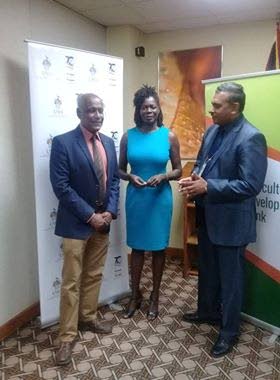Synthetic fertilisers, pesticides use down

DEAN of the Faculty of Food and Agriculture at the University of the West Indies Dr Wayne Ganpat says this country has been known for its excessive use of synthetic fertilisers and pesticides in farming but the usage has fallen over the years.
He was speaking on Wednesday at the media launch of the faculty’s
international conference on Climate Change Impacts on Food and Nutrition Security at
the Agricultural Development Bank (ADB), Port of Spain. The conference will be held from November 12-16 at the Radisson Hotel, Port of Spain, and the ADB is the main sponsor.
Ganpat said among all the regions in the world to use synthetic fertilisers and inorganic pesticides, it is fairly well established that farmers in TT use them a lot.
He said this is because the country is able to produce fertilisers at lower costs than elsewhere and a lot of pesticides are imported. He added around the 2000s the use of synthetic fertilisers and pesticides became an international issue because of the impact on human health.
PESTICIDES IN
FOOD WE EAT
“A lot of the vegetables we eat, we eat them raw. We hardly cook them. And pesticides end up in the vegetables.”
He said there was a movement and methodology proposed by the Food and Agriculture Organisation called “farmer field schools” where farmers across the world, including TT
and the region, were taught how to drastically reduce the use of synthetic fertilisers and pesticides.
“So this has significantly reduced over the years, thanks to our farmers taking this on board.”
Ganpat said he did not have statistics on hand on the reduction, but anecdotal evidence shows farmers were more sensitised to using safe pesticides such as neem and moringa and were using more composted material for fertilisers.
The topics to be addressed at the conference are: food and nutrition security, climate-smart agriculture, agro-ecological systems, and managing plant and animal health.
The conference is timely, he said, as climate change is a pressing issue facing the world and the Caribbean region.
“To be sustainable, agriculture must meet the needs of the present and the future generations for its products and services while ensuring profitability, environmental health, social and economic equity.”
ACTION NEEDS
TO BE TAKEN
He added: “Unless action is taken now to make agriculture more sustainable, productive and resilient, the impacts of climate change will seriously compromise food production in regions that already highly insecure – and I wish to remind you that the Caribbean region is highly food-insecure and Trinidad is (as well).”
Ganpat reported that in May this year the faculty held a national symposium on food and nutrition security and a report containing a number of policy suggestions was sent to stakeholders, the Agriculture Ministry and the Health Ministry. He said the faculty was awaiting a response from the Agriculture Minister, though he added it was sent
around the time of the national budget in October
and the minister would have been busy. Policy briefs would be produced from the symposium and the upcoming conference, he said, to be sent to governments and major stakeholders.
“Because it’s not only government. Government needs to take action, farmers need to take action, the university, reporting institutions; climate change governs all of us. We all have to take action, and we have to take action sooner rather than later to address the threats that will impact us because of climate change.”
ADB CEO Sheivan Ramnath said climate change was upon the country and everyone must be ready for it, not only in terms of academic research but practitioners as well.


Comments
"Synthetic fertilisers, pesticides use down"